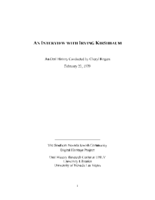Search the Special Collections and Archives Portal
Search Results
Selena Torres (Nevada Legislature, Assemblywoman) oral history interview conducted by Magdalena Martinez: transcript
Date
Archival Collection
Description
From the Lincy Institute "Perspectives from the COVID-19 Pandemic" Oral History Project (MS-01178) -- Elected official interviews file.
Text

Amy Bush Herzer oral history interview: transcript
Date
Archival Collection
Description
Oral history interview with Amy Bush Herzer conducted by Barbara Tabach on November 14, 2019 for the Remembering 1 October Oral History Project. Herzer begins the interview discussing her early life, education, and her current job as the University of Nevada, Las Vegas (UNLV) women's golf coach. She speaks about her family's history with golf, her personal history, and life with her husband, Kendall Herzer. After, she recalls where she was on the day of the October 1 shooting, and how she found out about the event, and recalls her husband reported to the main fire station as an Emergency Manager for the State of Nevada. She recalls keeping track of her athletes' whereabouts and letting their families know. Herzer describes how people reacted when she had brought a therapy dog, Apollo, in for the people donating blood and how the community came together to support each other and share resources as a community.
Text
Edythe and Lloyd Katz Photographs
Identifier
Abstract
The Edythe and Lloyd Katz Photographs (1947-1986) contain photographs of the businesses operated by Las Vegas, Nevada entrepreneurs Edythe and Lloyd Katz. The photographs primarily depict the movie theaters purchased by the Katz Family, including the Guild Theatre (formerly the Palace Theatre) and the Fremont Theatre. The photographs also depict the Katz Family and the Helldorado Days parade.
Archival Collection
Henderson Public Library Photograph Collection on Henderson, Nevada
Identifier
Abstract
The Henderson Public Library Photograph Collection on Henderson, Nevada (approximately 1940-1988) depicts life and growth in Southern Nevada. The collection documents the growth of Henderson, Nevada through images of Basic Magnesium Incorporated, housing throughout the area, and events. The documentation of Basic Magnesium Incorporated, its activites, personnel, and buildings from 1942 through 1944 is prominent in this collection.
Archival Collection
Nevada Mining Photograph Collection
Identifier
Abstract
The Nevada Mining Photograph Collection depicts mining activities, miners, and mining towns in Nevada from 1868 to 1937. The photographs primarily depict the towns of Tonopah, Nevada and Goldfield, Nevada, including mills, buildings, mine shafts, and panoramic views of the landscape. The photographs also depict Beatty, Lost City, Delamar, Candelaria, Winnemucca, Virginia City, Rhyolite, Elko, and Reno, Nevada. The photographs also include portraits of early settlers in Nevada, Native Americans, children, parades, celebrations, and funerals.
Archival Collection
UNLV University Libraries Collection of Boulder City, Hoover Dam, and Lake Mead National Recreation Area Maps and Brochures
Identifier
Abstract
The UNLV University Libraries Collection of Boulder City, Hoover Dam, and Lake Mead National Recreation Area Maps and Brochures (1927-1998) primarily contains regional maps, brochures for local points of interest, and subdivision plat maps of Boulder City, Lake Mead, and Hoover (Boulder) Dam.
Archival Collection
Julia Ratti (Washoe County Health District) oral history interview conducted by Kellian Beavers and Elia Del Carmen Solano-Patricio: transcript
Date
Archival Collection
Description
From the Lincy Institute "Perspectives from the COVID-19 Pandemic" Oral History Project (MS-01178) -- Government agency interviews file.
Text

Transcript of interview with Thomas Rodriguez by Maribel Estrada Calderón, September 10, 2018
Date
Archival Collection
Description
Known for “raising hell and making a difference” in the Las Vegas Valley, Thomas Rodriguez has dedicated more than four decades of his life to the political, educational, and social advancement of the Latinx community. Tom was born in 1940 to Jennie Gomez and Joseph Rodriguez in a Topeka, Kansas neighborhood its residents called The Bottoms. Mexicans, Mexican Americans, American Indians, African Americans, among other peoples lived in this diverse and beloved community. In 1956, the Urban Renewal Program, a program funded by the Federal Government that sought to raze neighborhoods the city considered to be “slums,” forced The Bottoms’ residents to abandon their homes. Rodriguez recalled the effects that this event had on his family and on his educational career. Despite his family’s relocation, he graduated from a high school located in a nearby neighborhood in 1958. Years later, the activism and ideology of the Chicano Movement of the 1960s taught Rodriguez that to overcome the injus
Text

Transcript of interview with Walter Dane by Ann Clark, March 11, 1978
Date
Archival Collection
Description
On March 11, 1978, Ann K. Clark interviewed her step grandfather, tire repairman Walter Dane, (born August 10th, 1914 in West Barnett, Vermont) in her, the interviewer’s, home in North Las Vegas. Also present during the interview is the interviewer’s mother, Marie Dane. Walter relocated to Indian Springs in 1930 before settling in Las Vegas in 1943. In 1968 he moved to Utah, where he resided at the time of this interview. Well-traveled, Walter discusses his many moves over the years. Ultimately, this interview covers the growth and development of the Las Vegas and Indian Springs areas.
Text

Transcript of interview with Irving Kirshbaum by Cheryl Rogers, February 23, 1979
Date
Archival Collection
Description
Interview with Irving Kirshbaum by Cheryl Rogers on February 23, 1979. In this interview, Kirshbaum discusses the Riviera Hotel where he began working in 1955. He also talks about the landscape of the Las Vegas Strip in the 1950s, and the state of gambling, comps, customer service, and dealer training. The interviewer asks about the treatment of minorities at the Riviera, and in Las Vegas generally, and the effect of corporate ownership on casinos.
Text
